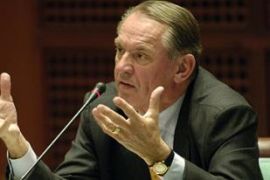Sudan declares Darfur ceasefire
Government makes unilateral pledge at talks boycotted by two major rebel groups.

| Al Jazeera exclusive | ||
|
|
“The government has already said several times since 2004 that they observed a ceasefire. They again spoke like this today. We have our doubts,” he said.
Ahmed Tugod Hassan, the chief negotiator of the Justice and Equality Movement (JEM) said the decision for his group not to attend the talks was made on Friday with the Sudan Liberation Army (SLA) unity factions after consultations in the run-up to the talks.
Dialogue urged
Mohammed Adow, Al Jazeera’s correspondent in Sirte, said AU and UN mediators urged all factions to enter dialogue in opening remarks at the talks.
“The AU and the UN mediators opened the peace talks with an impassioned plea to the rebel groups who are staying away from the talks,” he said.
“Their message was ‘stop the conflict, and come to and talk peace here’. What they were saying is that the conflict in Darfur has the ability to not only destabilise Sudan but the whole continent.”
International mediators had hoped as many groups as possible would attend the talks to negotiate a way forward.
Since a peace deal signed by only one of three rebel factions last year, the fighters have split into more than a dozen groups.
Clinging to hope
Speaking before the talks, Jan Eliasson, the UN special envoy for Darfur, said the peace process was “irreversible” and that it represented “a very important step towards a political settlement”.
But Adow said only “a handful of Darfur rebels are ready to talk peace.
“They have been struggling to find common ground before negotiations begin. And their dismal number has been a concern for the mediators. But they are vowing to carry on.”
He said Abdelwahid Elnur, leader of the Sudan Liberation Movement (SLM), had rejected the talks and Khalil Ibrahim, the main leader of JEM, was not attending either.
Frustration
Adow said the mood around the talks was one of frustration because of the poor response.
Likewise, speaking from Al Fasher in northern Darfur, Al Jazeera correspondent Mohamed Vall said: “Frustration is very deep here, in the IDP (internally displaced peoples) camps.
| In video: Sudan | ||||
|
|
“The leaders of the Darfur groups such as Elnur and the JEM say they will not attend the peace talks in deference out of respect for the wishes of the people.
“But when we talk to the people here, they say they are not very well informed about the situation and follow the developments on the basis of what their leaders tell them.”
The run-up to the talks has also been overshadowed by a rebel attack against an oilfield in a region disputed by Khartoum and Sudan’s former southern rebels.
The JEM claimed to have kidnapped two foreign oil workers.
Criticism
Vall said some groups claim that many Darfur tribes have been excluded.
Othman Kibir, the governor of north Darfur, said: “Darfur doesn’t belong to a handful of groups only. The African Union, United Nations and the international community should talk to all parties, and listen to all parties.”
“To the representatives of the United Nations and the African Union, I urge you to be part of the solution, not part of the problem.”


